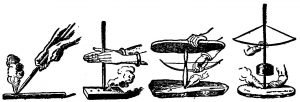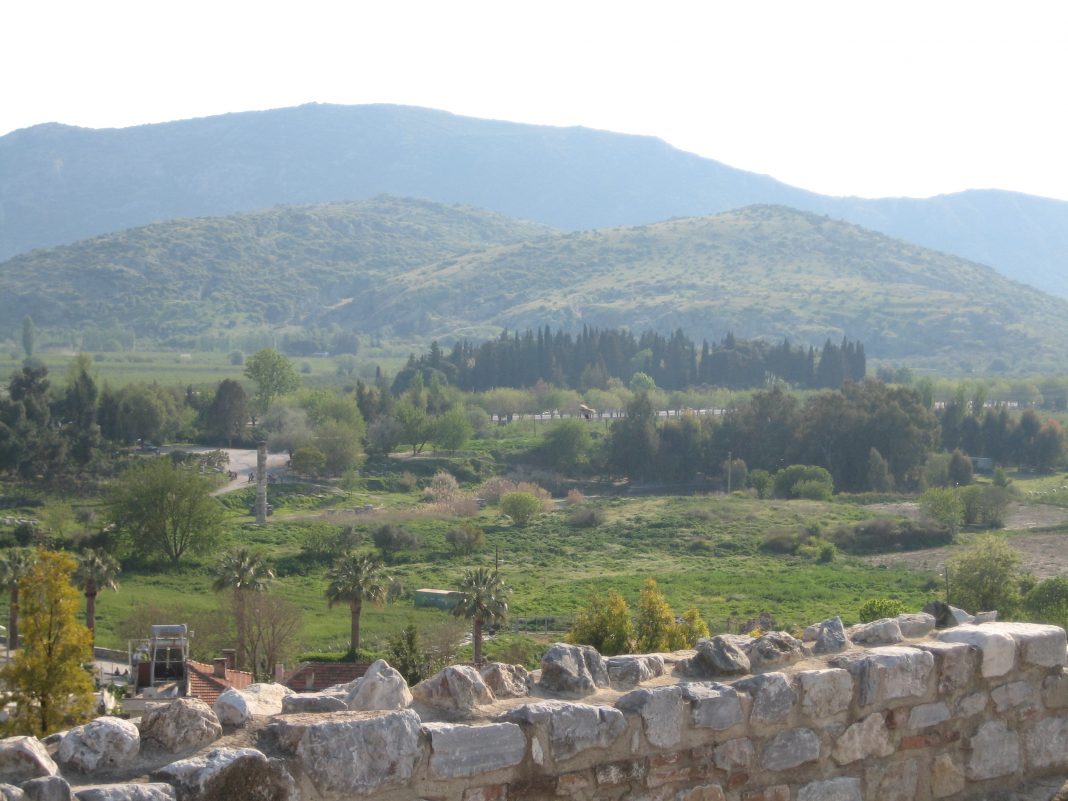The following is an excerpt (Chapter II, pages 12-16) from Ancient and Medieval History (1946) by Francis S. Betten, S.J. Although some information may be outdated, the Catholic historical perspective it provides remains pertinent. Use the link at the bottom of post to read the previous/following pages. Use Search to find specific topics or browse using the Resources tab above.
CHAPTER II
FIRST AGES AFTER THE DELUGE
3. The Families of Nations. — After relating the story of the Tower of Babel, Holy Writ gives us the names of Noe’s next descendants, with some short hints as to their dwelling places. These valuable notes connect as it were by a thin thread many of the great nations of the earth with the persons saved in the Ark. The three sons of Noe became the ancestors of three families of nations. The descendants of Sem (Shem) are called the Semites; to them belong the Assyrians, Arabs, and Jews. Cham (Ham) was the father of the Hamites, among whom are the Canaanites (the original inhabitants of Palestine), Babylonians, Egyptians, and the negroes of Africa. The Aryans or Indo-Europeans, comprising the Hindus, the Medes and Persians, the Greeks, Italians, Celts, Germans, and Slavs, were the offspring of Japhet. Mixture of race, however, and the influence of climate and country produced an infinitely greater variety than this plain enumeration would lead one to believe. There is in fact hardly any people in the world which represents an unmixed stock. It ought not to surprise us if many a people, the Chinese for instance, does not fit neatly into our simple classification.
Sameness of language as a rule argues sameness of origin. Yet some few nations have exchanged their own idiom for that of a neighbor. On the other hand, learned men assure us that the diversities among the inhabitants of the globe, such as color and language, are no reasons for doubting the unity of the human race. The languages, in spite of their variety, positively point to one common origin.
4. Religion after the Flood. — Unfortunately the extension of mankind over the earth was, on the whole, accompanied by a decay in religion and morals. In the course of time much of the supernatural truth revealed to Adam and by him transmitted to his children became obscured. The worship of the One True God gave way to idolatry. Even the natural knowledge of man’s various duties was very generally disregarded or overlaid with gross superstitions and errors.
In the beginning this deterioration probably proceeded rather slowly. Much that impresses us as polytheism may have been the adoration of one God under different names in the various cities or regions or villages. When these became united into one large state, the different names of the one God may have been taken to denote different divine beings. Then when many gods were imagined to exist, people could more easily yield to the temptation of making gods or goddesses of the forces of nature which are either useful or terrible to man. The neglect of the one true God was almost invariably accompanied by the neglect of His commandments, a neglect which, indeed, in some countries assumed a shocking degree. Since God’s law is written in every man’s heart, it is not surprising if, even among pagans, instances of genuine natural virtue are observed.
But the Almighty did not forget the promise given to the first parents. When idolatry threatened to enslave all mankind, He took care that at least one nation still worshiped the God “Who made heaven and earth,” and hoped and waited for the appearance of the “light for the revelation of the Gentiles.” This was the Hebrew nation.
5. Civilization after the Flood. — At the time of the flood, mankind must have been on a very high level of civilization. Arts were practiced, metal instruments were in use. The construction of a vessel of the dimensions and character of the Ark and the planning and partial erection of the Tower of Babel suppose an astounding proficiency in mathematical knowledge and technical ability. This precious heirloom was not suddenly lost. The various tribes took it along to their new domiciles. It benefited them, however, only where large numbers of people settled together, and where nature supplied the necessary material. If thrown into less favored regions and deprived of connection with the stream of original civilization, they could forget or fail to practice much of what they or their fathers had seen in their ancient homes. Their civilization sank to a lower level and was likely to sink still lower with every new generation. The natural sources of history disclose the fact that nations living at the same time but in different countries often show remarkable difference in civilization. Far from being surprising, this is but the consequence of the dispersion of the human race.
Such tribes, rendered helpless by isolation and the miserly character of their soil, frequently resorted to a very primitive mode of life. Stone, wood, or bone was the only material they knew how to work into implements for household use or into weapons for the chase. Similarly, intellectual civilization, i.e., the taste for arts of all kinds and a theoretical knowledge of nature and its secrets, could wholly or in part be forgotten. With regard to such tribes or nations we speak of a Stone Age, or Bronze Age, or Iron Age,[1] according to the material which they used chiefly for their tools or weapons.

We cannot maintain that there was a time when all nations of the earth were in the Stone Age, or in the Bronze or Iron Age. That some peoples passed from a stone period to the use of bronze and iron is certain, and so far as we can see, in most cases the art of working these metals was not reinvented by them but was received from other nations which had never lost this accomplishment. It would be unwarranted, too, were we to conclude that men in the stone period possessed only a very low degree of intellectuality or morality. (See illustrations.) But even those nations whose culture had sunk to a very low level retained the possession of three elementary features of civilization; namely, the use of fire, the use of domestic animals, and the use of agricultural plants.
6. Indeed, many of the races into which mankind was divided after the Deluge lost a considerable part of their civilization. God saw to it, however, that civilization was preserved elsewhere. Some nations always kept the torch of material and intellectual civilization burning, and in their turn spread its light abroad.

They added to it by their own inventions, by devising better methods of government for cities and empires, by increasing the knowledge of nature, and by building up systems of every kind of science. Each people did this according to its own character, thus giving to its civilization a peculiar national type. Savage or barbarous races, too, have risen to a higher degree of culture. But they never raised themselves. The only efficient way of reclaiming fallen races is vigorous contact with one more highly civilized.
7. The Art of Writing. — Men want to write simply because they desire to leave to posterity some record of great events, or because they wish to communicate some news to those at a distance. This general desire has created the various writings of the world. Most nations, even such as are by no means upon a high level of civilization, have devised some sort of writing of their own, consisting chiefly of crude pictures.(§§ 24 and 42).
Often nations have adopted and even further developed a system of writing which was devised by some other people. Thus our own writing has come down to us, through the Greeks and Romans, from some of the oldest nations known to history, and it was improved by each of the peoples which successively employed it. Unless a people is equipped with a fairly good system of writing, which enables it to leave to posterity documents or inscriptions on stone or metal, we cannot know much of its fate, its successes and failures, except, perhaps, through the writings of other nations with which it came into contact, or through relics, which furnish only an incomplete knowledge. Peoples which have left no written records are often referred to as prehistoric. (See H. T. F., “ Prehistoric Times.”)
8. The nations we are going to treat of are those enumerated on page 5, because we owe to all of them a great deal of our own civilization.
There are other ancient countries in the world, the history of which would be well worth knowing; for instance, China, Japan, and India. To write on these nations also would make our book too bulky. Besides, the civilization of these lands has nothing to do with our own. Its history, therefore, cannot contribute to the explanation of our own customs and institutions.
The most important feature in the life of a people is its religion or lack of religion. The student will therefore perhaps expect to find much about the history of religion in this book. But our purpose is to study in particular the secular history of those nations. Hence religion cannot be treated at such length as would be the case if it were our principal aim. Nevertheless, much must be said on this subject also, because of the profound influence of religion upon the policy and fates of the nations. We shall call attention to the most important pagan religions, point out their weak features as well as the traces they contain of genuine religious truths, and notice their influence upon the lives of the people. We shall, above all, lay due stress upon the history and religion of the Jews, who were to prepare the world for the coming of the Redeemer promised by God. We shall emphasize the history of Jesus Christ, His arrival in this world, His preaching, and the foundation and progress of His kingdom on earth, the Church.
1Bronze is an amalgam of copper and tin. It is harder than either of these two metals, but not so hard as iron.


